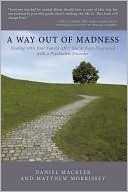
| Title | : | A Way Out of Madness: Dealing with Your Family After You've Been Diagnosed with a Psychiatric Disorder |
| Author | : | |
| Rating | : | |
| ISBN | : | - |
| Language | : | English |
| Format Type | : | Kindle Edition |
| Number of Pages | : | 180 |
| Publication | : | First published March 12, 2010 |
Contributors include:
Patch Adams, M.D., inspiration for Robin Williams film
Joanne Greenberg, author, I Never Promised You a Rose Garden
David Oaks, director, MindFreedom International
Will Hall, co-founder, Freedom Center
"
A Way Out of Madness: Dealing with Your Family After You've Been Diagnosed with a Psychiatric Disorder Reviews
-

A self-help manual for psychosis, this book has got to be unique. As a parent, I am not the intended target audience for this book. This book is aimed mainly at young people in their late teens or twenties who have suffered a mental health breakdown and now have to pick up the pieces, usually under the anxious eyes of their families. I gifted this book to my son and have been stealing time with it ever since.
I am relieved that this book was written because, to be selfish about it, it makes my job easier. The chapters' authors say what I have been saying to my son, but the difference is, they've been there and they are opinionated about the role of the family as a force for both good and evil. For every mother and father who is wondering why their child is still at home on the couch after several years, the advice given here will cause you to cheer. You don't have to risk the high Expressed Emotion of clumsily nagging your child to do something with his life. Your relative is finally hearing it from people who've been there at that age: "Get a job or go back to college," "realize that your family may not be the best support for you at this stage," "you're probably spending too way much time with "mother," "learn to set limits," etc. etc. etc.
It is clear from this book that whoever has suffered a psychotic break has been victimized on some level. The book urges people to acknowledge this, but move on, even if it means distancing yourself from family. It also lists ways in which families can abuse their powers over the individual, sometimes unintentionally, other times not. I, for one, am delighted that my relative is hearing it like it is. This book is written by people who were labeled, medicated, and had a rocky start, but they figured it out and moved on. Others may disagree, but I am of the opinion that most parents want their children to be independent - one of the greatest gifts that a parent can give a child is to encourage the child stand on his or her own two feet. Often, though, the labeled child is overly attached to the parents, unconsciously feeling that he or she must please us, appease us, and generally be there for us. This self-sacrificing is a problem and most likely the reason for the label in the first place.
I would love it if my son began to mentally distance himself from me as one of the many steps on his road to independence. He needs reinforcement from outsiders. Positive views about psychosis and mental breakdowns and what to do about it are hard to find in the literature. This kind of advice has generally been promulgated by doctors and psychologists, not consumers. Dr. E. Fuller Torrey has had a monopoly on this kind of advice for far too long. He is bleak. Do you want bleak for your relative? It is time for a fresh perspective that empowers the person to heal himself. Do yourself and your relative a favor by buying this book and do let others know about it.

